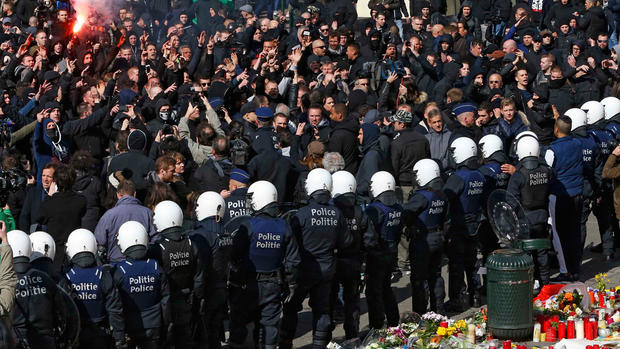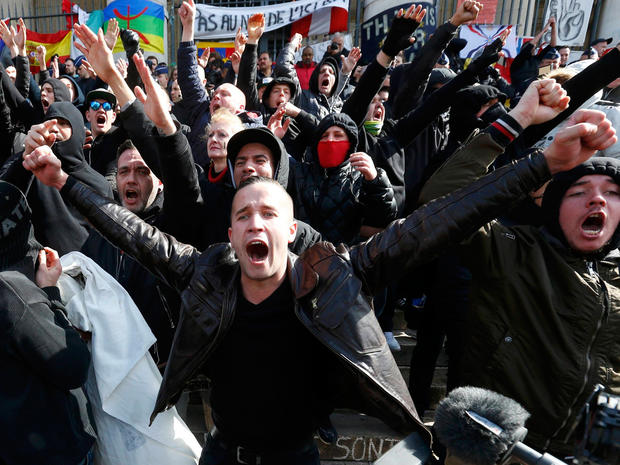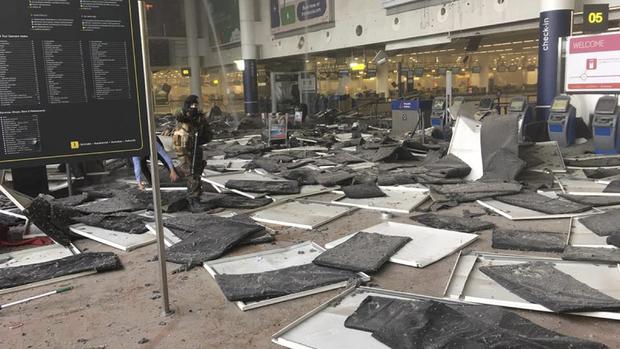Right-wing "hooligans" battle Belgian police at shrine
BRUSSELS- In a sign of the tensions in the Belgian capital and the waysecurity services are stretched across the country, a planned "March Against Fear" in the city planned for Sunday was canceled at the interior minister's urging, and was instead spontaneously replaced with clashes between self-described "fascists" and police.
"We understand fully the emotions," Interior Minister Jan Jambon told reporters. "We understand that everyone wants to express these feelings."
But, he said, "we invite the citizens not to have this demonstration." Instead of a peace march, far right-wing demonstrators took to the streets of Brussels.
White-helmeted riot police were involved in the attempt to control the right-wing protesters, which public broadcaster RTBF said numbered between 500 and 1,000. At one point, police used a water cannon to disperse what some described as a riot. Several news outlets reported the protesters giving Nazi salutes and aggresively confronting Muslim women at the shrine.
Ten were arrested and two police officers were injured.
"We had 340 hooligans from different football clubs who came to Brussels and we knew for sure that they would create some trouble," Police Commissioner Christian De Coninck said. "It was a very difficult police operation because lots of families with kids were here."
Brussels mayor Yvan Mayeur expressed his disgust, with Belgium still in mourning over the suicide bombings at Brussels airport and subway, which killed at least 31 people and injured some 270.
"The police were not deployed to protect people from these hooligans but a whole other threat," said Mayeur told RTL television.
People trying to pay their respects were also dismayed.
"It was important for us to be here symbolically," said Samia Orosemane, a 35-year-old comedian. But, she added, "there were lots of men who were here and doing the Nazi salute, shouting 'death to Arabs' and so we weren't able to get through."
"We are all here today for peace, and for the brotherhood among peoples. Not for right-wing ideas. It's neither the time nor the place," said Theophile Mouange, 52.
Much like in France after the Paris attacks, public interest in fiery far-right nationalistic populism has exploded in popularity. Vocativ reports Facebook likes for Vlaams Belang, the right-wing populist party from Flanders, has surged more than 3,000 percent.
Meanwhile, Belgium's government sought to contain criticism of its handling of the Brussels attacks on Sunday but acknowledged that neglect over decades had caused deficiencies that have hampered an effective response to violent extremism.
Jambon said the government has invested 600 million euros ($670 million) into police and security services over the past two years but said its antiquated justice system and security services were still lagging behind.
Jambon, whose offer to resign on Thursday was declined by the prime minister, said errors were made prior to the March 22 suicide bombing attacks in Brussels that killed at least 31 people and wounded 270 others.
But, speaking on the VRT network, Jambon said hiring anti-terror specialists and specialized equipment does not happen in weeks or months and insisted that new investments need time before they become visible to the public.
As international pressure on Belgium mounted for serving as an unwitting rear-base for Islamic State of Iraq and Syria (ISIS) extremist fighters who launched the Nov. 13 massacres that left 130 dead in Paris, the government has been forced to defend its choices and the actions of investigators. Lawmakers, meanwhile, are demanding an inquiry.
Belgian police and the army have been deployed, sometimes around the clock, at major buildings and sites in the capital in increasing numbers since November, when Brussels went into lockdown over fears that top Paris suspect Salah Abdeslam had returned and was hiding there.
As it turned out, Abdeslam did return, but police did not find and arrest him until March 18, four days before suspects from his network exploded suicide bombs in Brussels.
Belgian investigators have been slammed for not questioning Abdeslam long enough or hard enough after he was shot in the leg during his arrest. Police have also been criticized for taking too long to get to Zaventem airport on Tuesday morning after two suicide bombers blew themselves up there - and left an even bigger third suitcase full of explosives.
"There have been errors," Jambon said Sunday, when questioned by VRT television about his offer to resign.
Jambon and Justice Minister Keen Goens were grilled by lawmakers Friday over how authorities failed to arrest suicide bomber Ibrahim El Bakraoui before he blew himself in the packed departure hall at Brussels Airport.
Turkey has said that Bakraoui - whose brother Khalid was the suicide bomber at the Maelbeek subway station on Tuesday - was caught near Turkey's border with Syria in 2015 and Ankara had warned Brussels and the Netherlands that he was "a foreign terrorist fighter." Belgian authorities said they did not know he was suspected of terror-related activities until after he was deported to the Netherlands.
Jambon also said the Brussels subway network had been told to shut off services 20 minutes before the attack in the city's Maelbeek subway station - close to European Union headquarters and the U.S. embassy. He did not fully explain why it was not closed in time, raising more questions about the efficiency of Belgium's security services.
"It serves no purpose looking for polemics, considering the circumstances," Jambon said.
On Sunday, Italian police in the southern city of Salerno said they had arrested an Algerian wanted in Belgium for an alleged false ID crime ring facilitating illegal migration linked to the attacks in Paris.
In the center of Brussels, a "march against fear" planned for Sunday was cancelled after Jambon asked people to stay away since police were too stretched to provide security and were needed for the ongoing investigations into the Brussels attacks.
Instead on early Sunday, numerous members of the Vlaams Belang party, whose primary position is seeking independence for Flanders, the Flemish speaking portion of Belgium, took to the streets outside the old stock exchance in Brussels.
After the Paris attacks, Marine Le Pen's anti-immigration National Front made large electoral gains in France after having spent years staking out a position that plays on fears of terrorism and immigration.
At the Maelbeek subway station, messages of sadness, solidarity and grief left for victims of the bomb attack there were being collected for storage in the Belgian capital's archives.
The messages were being laid out Sunday on absorbent paper to dry after overnight rain and carefully stacked for transport. Those that can't be taken for safekeeping were being photographed.
"We are trying to collect as many documents we can find and they will be preserved," promised head archivist Frederic Boquet.
Marina Queralt, who often walks with her dog by the Maelbeek station, said the public response to the attacks has been spontaneous and focused on peace.
"Every morning, every afternoon, (the site) was packed with people who wanted just one thing: that people stop killing each other," she said.


